NUS University Town Awarded the ISCN Sustainable Campus Excellence Award 2017 (Building and Innovative Infrastructure)
At this year’s International Sustainable Campus Network (ISCN) Conference, NUS’ University Town (UTown) was awarded the ISCN Sustainable Campus Excellence Award (Building and Innovative Infrastructure) for its exceptional sustainability performance. The Award was received by Prof Yong Kwet Yew, Vice President (Campus Infrastructure) on 29 June at the University of British Columbia.
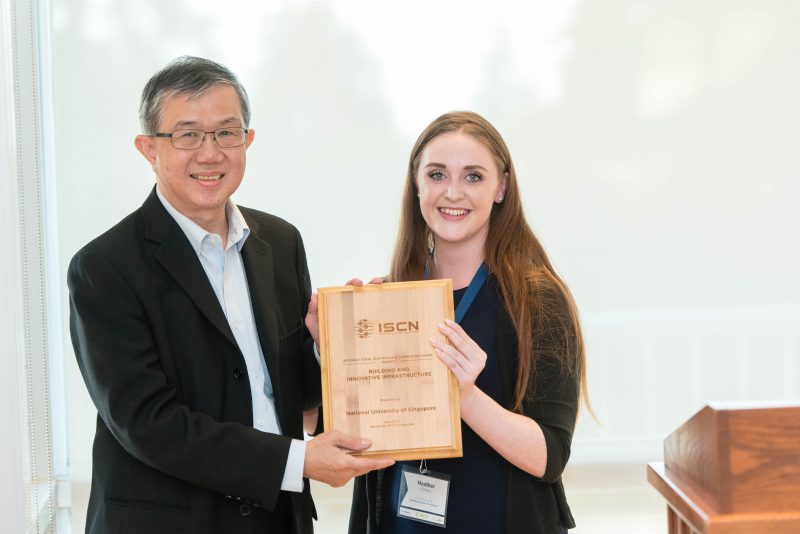
The ISCN Sustainable Campus Excellence Awards recognise universities for exceptional sustainability efforts in campus planning, integration with academics, student leadership, and building projects. Other winners of this year’s Award are: University of Applied Sciences Trier, Germany (Campus Planning and Management Systems Award), Swarthmore College, United States (Innovative Collaboration Award), and Chiba University, Japan (Student Leadership Award).
Every year, the ISCN Conference brings together thought leaders, practitioners and change agents for a unique opportunity to exchange perspectives and form global partnerships in pursuit of sustainability. This year, the ISCN conference was co-hosted by the University of British Columbia and City of Vancouver. Themed “Climate. City. Campus.”, this year’s conference focused on how activities on campuses and at cities contribute to climate change at a global level.
About UTown
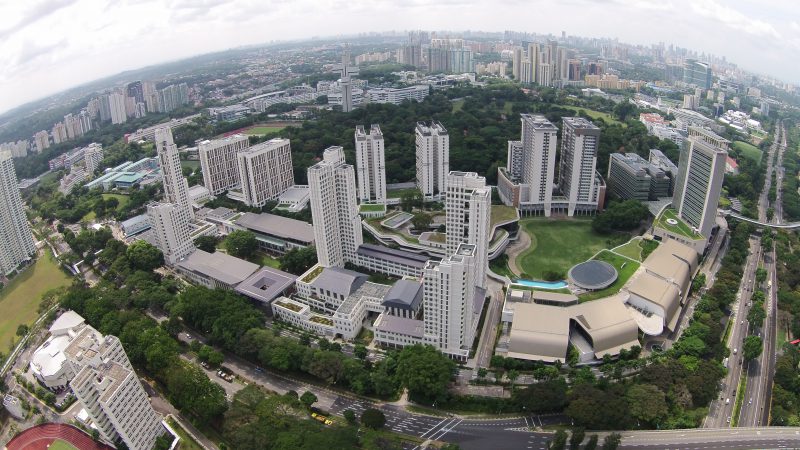
UTown is a 19 hectare mixed-use residential, sports, educational and research development. An extension of NUS’ main Kent Ridge campus, UTown occupies the site of a vacated golf course which offered a unique opportunity to create a sustainably designed, built and operated precinct of this scale from scratch, whilst retaining much of the original lush tropical terrain.
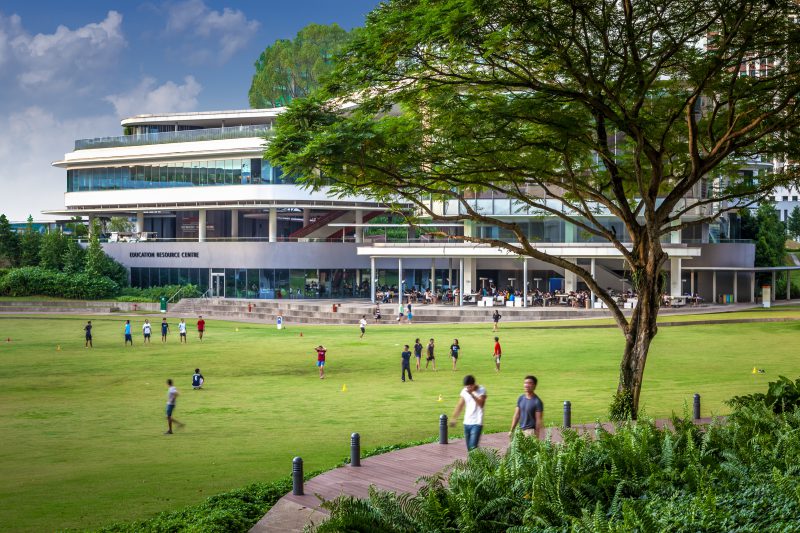
Masterplanned from the onset but constructed in phases, UTown comprises four residential colleges, a student residence, an education resource centre, a sports complex, a research and development complex and Asia’s first liberal arts college upon its completion in 2015. This extension campus is now where a total of 15,000 (on average) undergraduate and graduate students, staff and researchers work, live, learn and play – providing a holistic learning environment and a vibrant student experience.
As Singapore’s 1st Green Mark district (awarded by Singapore’s Building and Construction Authority) and with all buildings within the precinct at least Green Mark certified, UTown exemplifies NUS’ commitment to a more sustainable campus environment by realising three objectives – to achieve low carbon emissions, to conserve and encourage the growth of an ecologically biodiverse habitat; and to create a sustainable pedagogical environment enjoyed by all campus users.
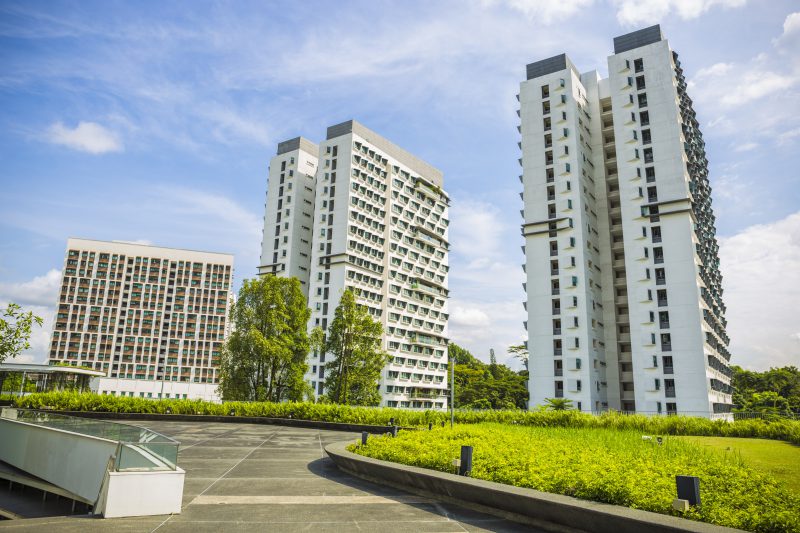
Each year, UTown is estimated to cut down on 3.8 million kWh of electricity, saving close to $1 million; and some 244,800 cubic metres of water – enough for almost 100 Olympic sized pools. For example, the extensive green roofs at UTown are used to cleanse storm water as it filters through the plants and soil. A portion of the rainwater is then used to water campus plants while the remainder is pumped into a campus water feature.
In a tropical climate like Singapore, air conditioning is heavily relied on as a cooling mechanism, resulting in higher energy usage. To decrease the amount of energy required, major circulation areas in UTown were designed to maximise natural ventilation, supplemented by the use of mechanical fans to create a cool environment without sacrificing comfort. UTown also houses the first district cooling plant for a tertiary institution (for centralized production and distribution of cooling energy), so that the on-demand cooling needs of its buildings can be met in as efficient a manner as possible. To discourage excessive energy use, hostel rates at UTown Residence and the residential colleges are not inclusive of utilities charges arising from the usage of the air conditioning unit, and a separate charge is applicable via a prepaid or “Pay as You Use” scheme.
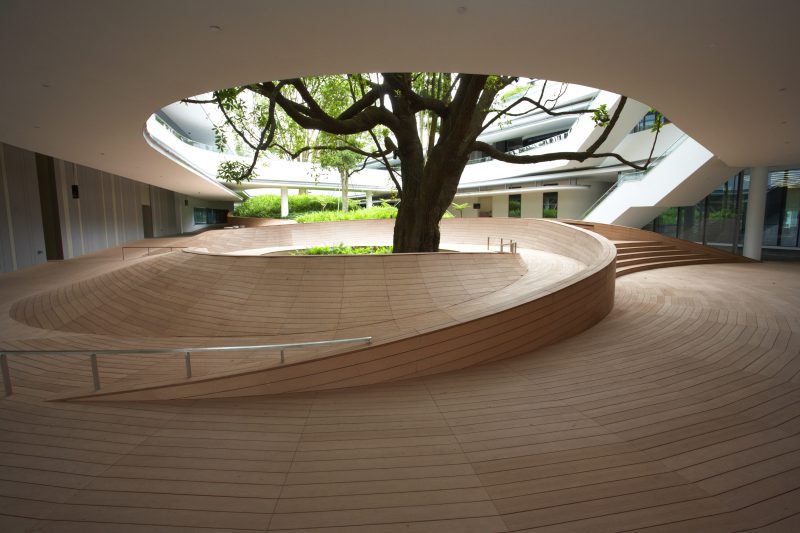
Optimising the integration of the built and natural environment as well as protecting the ecosystem were key considerations in the design and planning of UTown. Because the original site is rich in flora and fauna, a biodiversity study was conducted prior to planning and development. As far as possible, the natural biodiversity and a wide variety of native plant species were preserved. Trees of high heritage intrinsic value were retained, with buildings designed around them.
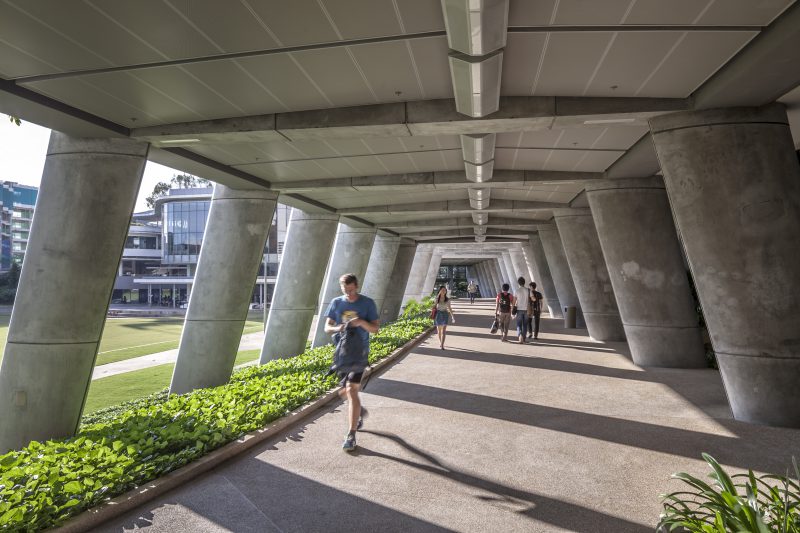
To encourage students to ride their bikes and walk on campus, UTown has an interior network of sheltered walkways and dedicated bicycle lanes. A covered link bridge connects UTown to the main campus, allowing students to walk or bike between the campuses.
UTown is NUS’ largest integrated sustainability-centric capital development to-date and is an important cornerstone as the University continues in its efforts to green its campus. The sustainability principles guiding UTown’s design and development also serve as a “template” for subsequent capital development projects that the University embarks on.
